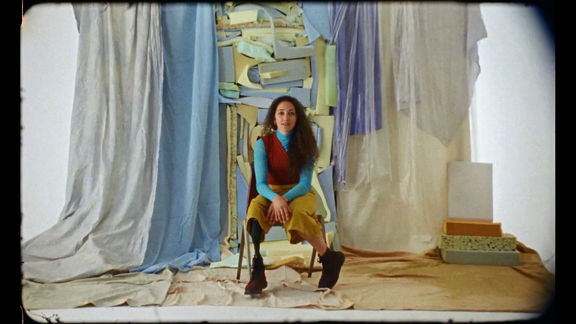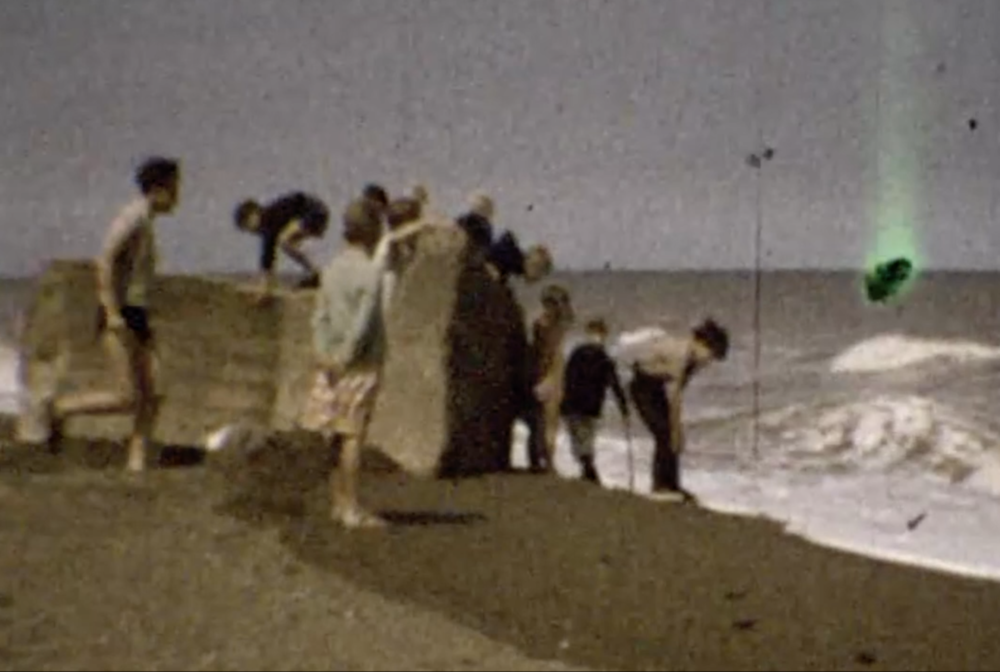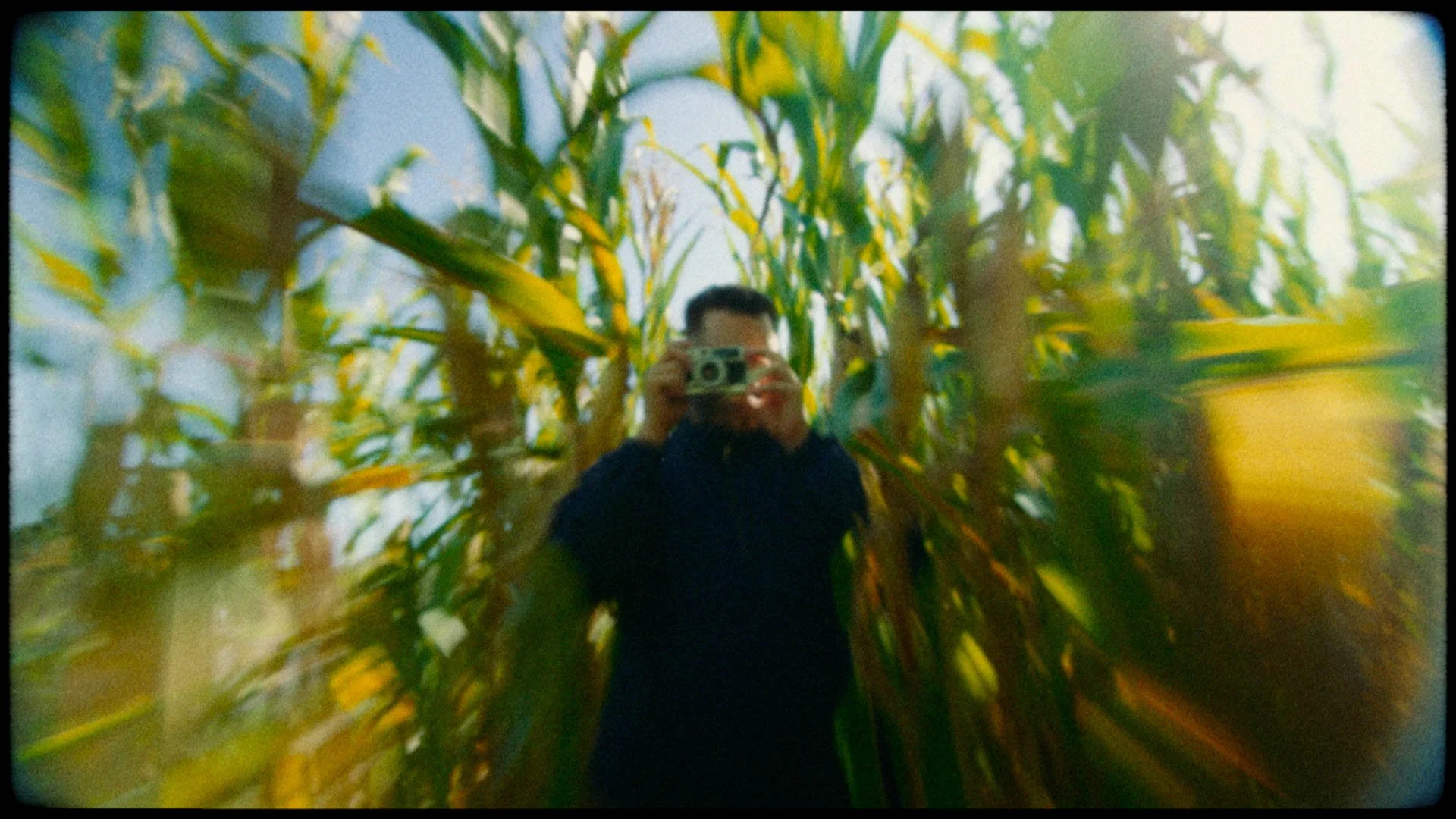Material Bodies
Directed by DOROTHY ALLEN-PICKARD
United Kingdom, 2020
Documentary
A sensual & cinematic look at the relationship between amputees & their limbs.
Read our interview with Dorothy below to learn more about the film.
DOROTHY ALLEN-PICKARD
Est. Reading Time: 7 Minutes
MARK (M) Tell us a little about yourself - when did you become interested in film and filmmaking?
DOROTHY (D) Since I was a teenager, I remember watching lots of films, particularly European movies and 80s American independent films and just really loving the experience of getting lost in other people's stories, a bit like with literature.
The first time I came to filmmaking was through documentaries, just borrowing a camera and shooting people I knew. This was before camera phones so I would go out and film people who I found intriguing in some way. I think I've always been drawn to making films about people around me. I would shoot family, friends or people who I walk past every day.
I'm particularly interested in the everyday and everyday people, the things that make their lives and experiences remarkable or relevant to an audience. That’s why I've made quite a few films with friends which I see as an extension of conversations that we have. When I get the feeling that I want everybody to be hearing what someone I’m close to is saying. This was the case for a short documentary I made called The Mess with my friend Ellice Stevens, it was also the case for one of my first short films called Old Pal and of course Material Bodies with Caitlin. My short fictional work is often based on experiences I can relate to, not necessarily experiences I’ve had but people, relationships and circumstances that I have some close relationship to.
On Her Practice
M I would love to know more about your practice, so can I ask why you’re interested in focusing on certain social and political issues? Where do you think this inspiration and instinct comes from?
D I think because I grew up in a political household, my mum is a strong feminist and at the center of my politics, at least when I was growing up, was an awareness of the existing inequalities between men and women, and the sexist lens through which many people see others. I have a desire to challenge those inequalities, both through making films and how I see the world.
And I think hopefully at the centre of my work, definitely at the centre and ethos of my upbringing, are humanist and political viewpoints, a sense of taking responsibility for our position within society, using and transforming any kind of privileges, advantages and comforts into something useful for society. If you fight to have a voice, then use it. If you can get anyone listening, then make what you say count.
M And this might be a pretty broad question, but what do you hope people will take away from watching your films? Do you hope to challenge or change their outlook/perception of marginalized individuals and communities?
D I hope when somebody has finished watching my film they take away something new. They may already know the subject and be familiar with it but I hope there's some kind of new and interesting insight.
I look to tell stories and work with people who are misrepresented or underrepresented. I wouldn't say I'm in the minority anymore in terms of my interest in subjects like mental health, disability or homelessness. I think more people are becoming aware of and interested in these topics.
I’m interested in the experience of those at the margins, who are dehumanized or objectified. I guess most of my filmmaking is an attempt to find an alternative narrative to mainstream media.
On The Participants
M Can you tell us a little about how you met and got to share the stories of Caitlin, Daniel, Kat and Mickaella? Tell us about why you were interested in focusing on their particular stories.
D Caitlin is one of my oldest friends, I've known her since I was 11. She's really the reason why I became very interested in the lives, experiences and subjugation of disabled people. In some ways I think I was very fortunate to grow up with a friend who has a disability. It's made me aware of how terrified a lot of people are about even talking about it. And it's something that she's experienced her whole life in different ways. When she suddenly had an amputation about five or so years ago, the way people treated her changed quite drastically.
Making Material Bodies was an intimate and personal exploration of people’s relationships with their prosthetics, to counter the way people perhaps see them as something that is cold, robotic or purely functional. Now, there's a lot of association with Paralympians so you have to be strong and inspiring when actually I think that people who wear prosthetics, from what I've understood through Catlin, have a more complex and multi-faceted relationship with this limb. So the film was an attempt to take the lid off and look at people's very personal relationships with this thing that is simultaneously part of their body and an object that can be separate from them.
On The Opening
M I love the opening dance sequence with Mickaella - it’s really intimate and sparks so much curiosity and intrigue. So I would like to know more about how you designed and pieced together this sequence - were you always planning to open the documentary with Mickaella’s choreography?
D I directed and edited the film but I had absolutely no idea about how I was going to bring together all of the disparate elements that we shot. I just knew that I wanted to organise interviews, and through Caitlin's network and the research we found the different contributors. I then knew I wanted to include a dance element involving Mickaella, somewhere in a tough concrete urban environment, and I also wanted to shoot in a studio, exploring the properties, colours and textures of different materials because this was the root of Caitlin’s research.
So we had all these elements but I only came up with the idea after lots of attempts in the edit room. It happened while the album by Batsumi was playing in the background. I found that Mickaella’s movement worked so beautifully with the song. I felt the slowness of the track invites you to hold your gaze and look quite closely for a moment at Mickaella’s choreography and movement.
‘I'm particularly interested in the everyday and everyday people, the things that make their lives and experiences remarkable or relevant to an audience’
— Dorothy Allen-Pickard
On Inspiration
M What are some of the films and who are some of the filmmakers that inspire you, and why?
D I don't have one main filmmaker who inspires me. I do still really love watching European and Asian films which I think are some of the best.
Some directors who inspire me would include Claire Denis, Jim Jarmusch, Andrey Zvyagintsev and Pawel Pawlikowski. These are directors whose work I just love and are definitely a source of inspiration. But particularly when making Material Bodies and with a lot of my other work, I don't so much turn to films for inspiration as I do photography or video art. I love going to exhibitions, and I read quite a lot about prosthetics and disability while making this film.
What I actually find more inspiring than watching brilliantly crafted films is when I end up in the cinema or at a screening watching really bad films, particularly short films. Often I have lots of ideas then because I’m not distracted by the film, I've got space to come up with ideas.
White Material (2009) by Claire Denis
Loveless (2017) by Andrey Zvyagintsev
On The Future
M What are you planning to make next?
D I’ve just finished a short fiction film called Weekend Dad, which is a drama about one father's desperation to see his young daughter and the risks he will take in order to do so. I'm planning to turn it into a feature film. I've co-written the feature script with my cousin Polly so the next steps are getting another draft in and showing it to people. I'm also collaborating with my theatre company ‘Breach Theater’ on a short comedy drama later this month, and I’m collaborating with my friend on an adaptation of a short story she’s written called Blended. So those are all things to come.
Mark’s Final Thoughts
So many inspiring takeaways and insights - I love how she blends the ordinary with the extraordinary to create very specific and unique projects.
Dorothy’s care and respect for her friends is really moving and sweet. It reminded me of Helen Takkin mentioning her friends as inspirations. It’s true that Dorothy’s lucky to have grown up with friends who have a disability, and her friends are equally lucky to know a person like Dorothy who takes an active interest in supporting their welfare.
Want to Learn More? Click here for Dorothy’s insights into planning and shooting documentaries as well as collaborating with her set designer to create tactile and textured backdrops.
The founder of Hommage, Mark Shaba published this interview on 28.10.2021. Mark is a filmmaker from Victoria, Australia. He respectfully acknowledges the past and present traditional owners of the land on which he creates, promotes and screens art, the Wurundjeri people of the Kulin nation who are the custodians.























